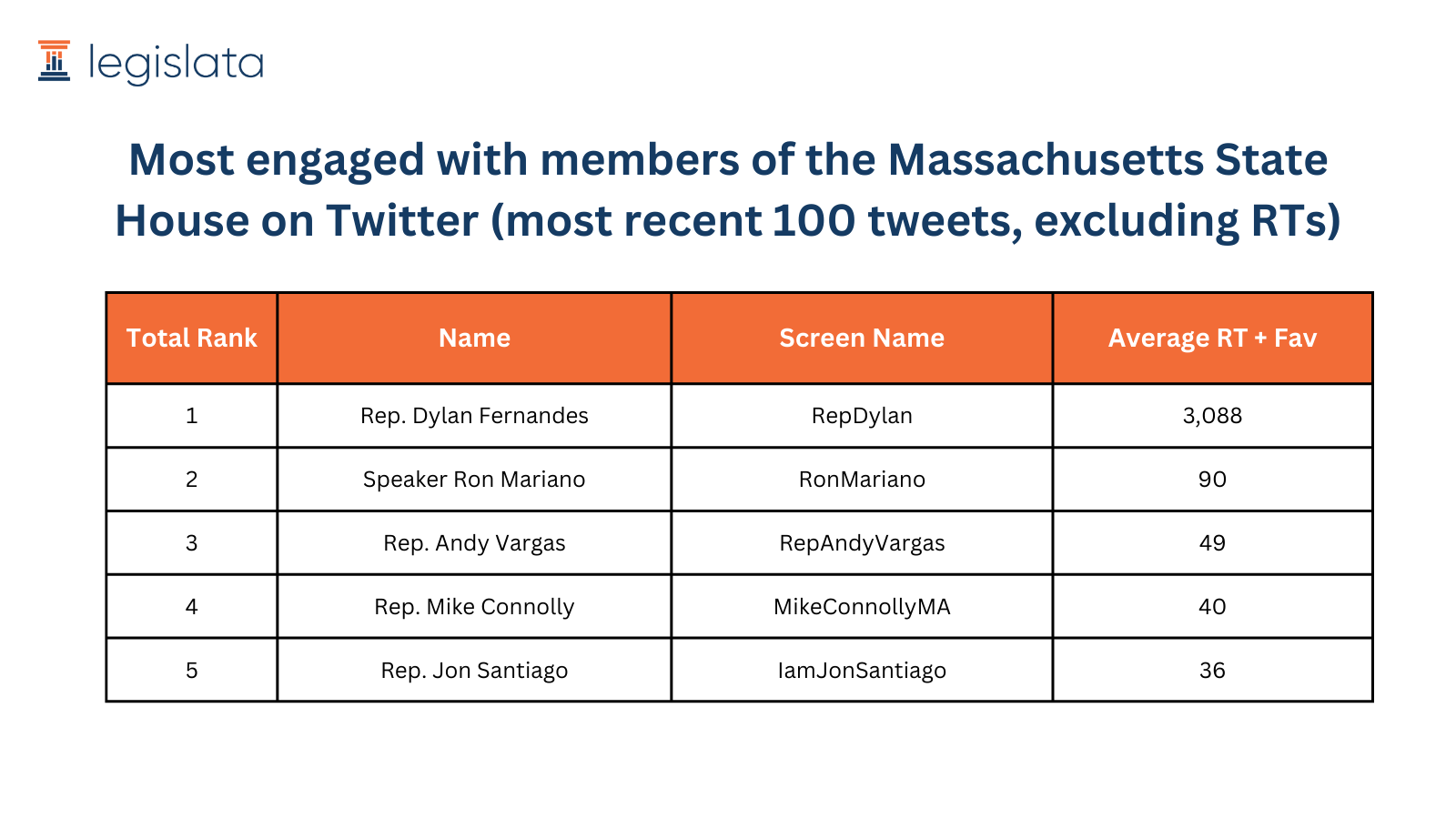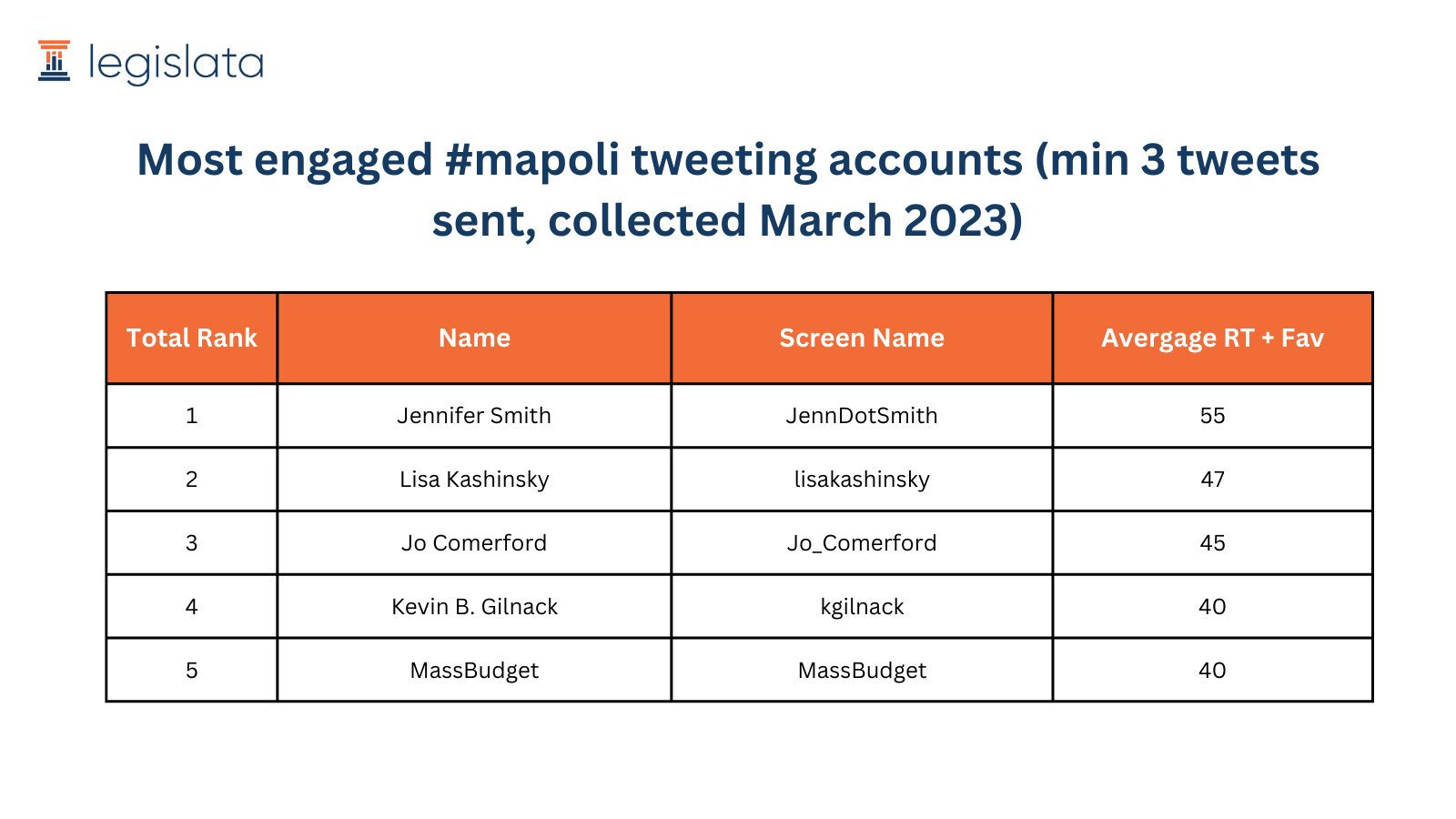Who are #mapoli’s power users? And is Twitter dying?
To wrap up our analysis on Massachusetts political twitter, we wondered who are the power users - those whose accounts are real assets for their jobs?
There’s no one way of analyzing this question. Instead, we’re looking at three angles among who has the most followers and engagement among the State House and those using the #mapoli hashtag.
Some highlights are below. The top 50 for each of these metrics is available here (free registration required).
State House accounts
Members of the State House have widely varying follower accounts, with some newer members having less than 100 and others above 10,000. Expectedly, the most followed account is the Senate President, but unexpectedly, the Speaker is only in 10th place, below two of his caucus. It appears that progressive members of the State House and Senators are more likely to have more followers, but it’s not an absolute correlation.
Most followers
Senate President Karen Spilka
Jamie Eldridge
Mike Connolly
Lydia Edwards
Dylan Fernandes
Cynthia Creem
Aaron Michlewitz
Harriette Chandler
Julian Cyr
Speaker Ron Mariano
For who receives the most engagement, we looked at the retweets + favorites for every member’s last 100 tweets. This is not a perfect metric: those that tweet infrequently may have more of an impact when they do, or it could be that frequent tweeters have built up more of a following that will respond.
As we see, far in the lead with engagements was Rep. Fernandes, whose tweets on the migrant flight to his district of Martha’s Vineyard received national attention. The Speaker and Reps. Vargas, Connolly, and Santiago, whose tweets about being appointed Veterans’ Services Secretary received high engagement.
#mapoli
We collected all tweets with the #mapoli hashtag in early March 2023. While this is only a portion of all tweets about Massachusetts politics, it coincided with the governor introducing her budget proposal, so we feel it is a week likely to see a representative sample.
We found that many of the most followed accounts were in the media or organizational accounts.
Howie Carr
GBH News
Samuel M. Gebru
State House News
Ted Nesi
ACLU Massachusetts
David S. Bernstein
Jonathan 'Boo and Vote' Cohn
Boston 87.7 FM
Strategies for Children
Interestingly, the most followed accounts did not necessarily have the most engagement (or did not tweet more than once or twice, since we set a minimum of 3 tweets to identify engagement trends). Instead, they were from accounts that seem to be more focused on Massachusetts politics specifically, which may mean that large numbers followers are less relevant than a specifically targeted audience as a followership.
Is state political Twitter dying?
A constant topic of political conversation is about the place we often have political conversations. Is Twitter dying? Are people leaving the site and it’s no longer relevant to the wider world? Is it even more of an echo chamber than before?
While we can’t know this for sure, we did run a small experiment. We collected tweets using #mapoli in August 2021 and a week in March 2023. August is a notoriously slow month and March saw the governor introduce her budget proposal, so we would expect to see more activity then. In fact, we saw one-third fewer tweets per day sent during the 2023 busy time than the 2021 slow time. We also saw fewer accounts using the hashtag and those with the most engagement were professionally involved in politics, unlike in 2021 when a lot of citizens and activists received a lot of engagement.
We also looked at the engagement of major elected officials to see if there were any trends. While the data is noisy, with jumps in engagement during elections or at random moments when a tweet went viral, we see a pattern of flat or declining average engagement. While not wholly dispositive, it suggests that the basis on which Twitter is relevant, its pool of users participating in political discussions, is slowly draining.
Takeaways
Twitter, at least theoretically, allows anyone to speak their mind. But not everyone is listened to equally.
For elected officials, there are tendencies with followerships and engagement. For those using the state political hashtag, having followers and having engagement are not equal.
Overall, the most important impact on engagement online is whether a tweet can escape the usual confines of interested viewers. Rep. Fernandes’ tweets on the situation on Martha’s Vineyard was of national interest, so his recent engagement was an order of magnitude larger than others’ in the legislature. Similarly (though on a smaller scale) was Rep. Santiago’s tweets on joining the Governor’s Cabinet.
As Twitter continues to change its algorithm and as the evidence seems to suggest there are fewer people tweeting about Massachusetts politics, a question remains whether the base level of non-viral engagement is enough to justify political actors to spend so much time on the app.






